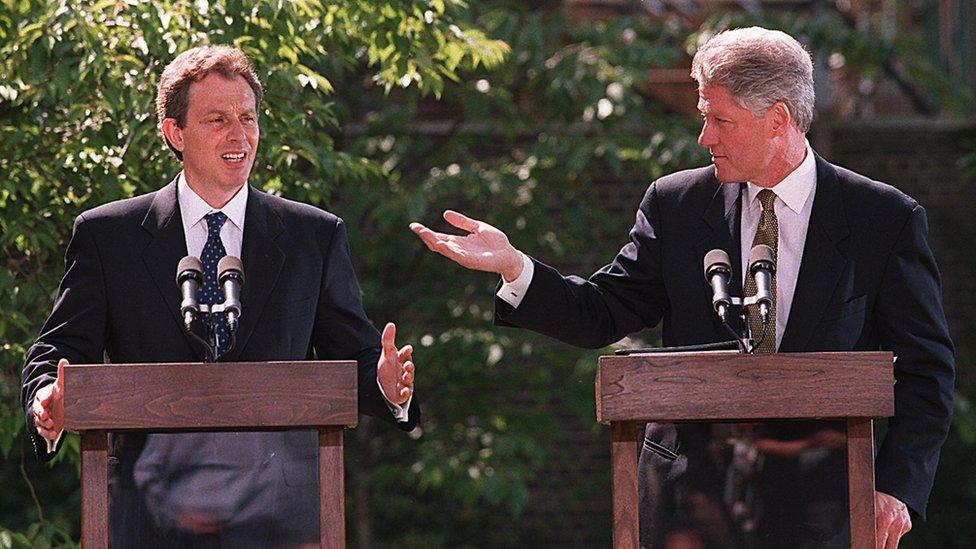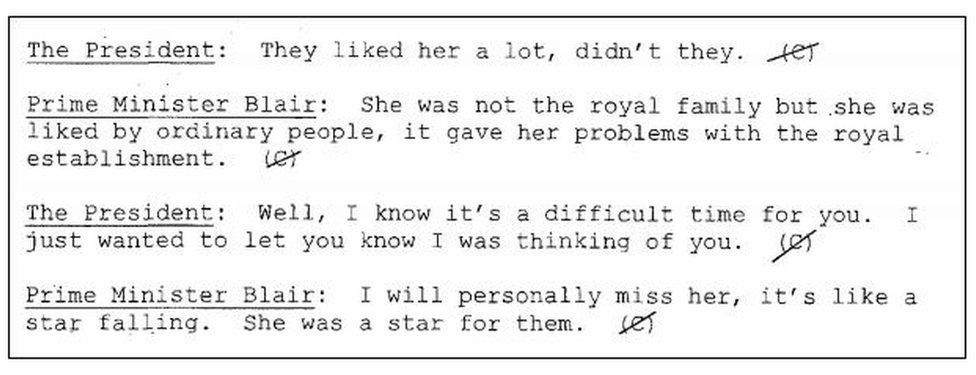Blair and Clinton: the peace process and fatherhood
- Published
- comments

Records of conversations between Tony Blair and Bill Clinton between 1997 and 2000 - obtained by the BBC - shed new light on their terms in office.
Tony Blair and Bill Clinton told each other that their role was to act like "shrinks" offering therapy to global politicians, as they tried to reconcile various bitter international disputes during their time in office.
But sometimes the frustration clearly got to them.
In 1999, during a fractious EU-US trade dispute over Caribbean bananas, President Clinton told Prime Minister Blair in one of their phone calls: "The Central Americans and the Caribbeans sound like a boys school argument. They ought to be thinking about making common cause and not pissing down each others' leg to see who has the biggest bananas."
This features in transcripts of calls and meetings between the two men that have been released, external following a BBC freedom of information request to the Clinton Presidential Library, external, which stores the records of his presidency.

The transcripts cover the period between 1997 and 2000, when the two leaders were both in power. They contain substantial redactions, especially of Mr Blair's remarks, but they shed light on their relationship and co-operation.
'Licks'
Much of their discussion was about the Northern Ireland peace process, in which President Clinton played a significant part. The president frequently promised the prime minister that he would say and do whatever Mr Blair wanted him to.
The pair were clearly often worried about the delays in the IRA decommissioning its weapons, and sometimes frustrated by their dealings with the Sinn Fein leader, Gerry Adams. At one point the president remarked that "We've all taken our licks for Gerry".
President Clinton also asked Mr Blair: "What's the date that Gerry does the actual decommissioning? When does the IRA actually have to turn some guns over?" and at another time: "Do you think the IRA has decided they are never going to decommission?"
And talking of Mr Adams he said: "I don't know what the real deal is between him and the IRA. It's hard to put pressure on him when you don't know what's going on. It's just bizarre."
'Crazies'
It's very noticeable from the transcripts that they tended to talk of "Gerry", and also "Bertie" for the Irish Taoiseach (prime minister) Bertie Ahern, whereas the Northern Ireland Unionist leaders were generally referred to as "Trimble" and "Paisley".
There was sympathy for some of David Trimble's political difficulties. The president referred to "all those crazies in his party" and asked Mr Blair: "Do you think there is anything we can do to Trimble to stroke him?"

Mundane dilemmas were also discussed, such as once whether it was too late for President Clinton to phone Gerry Adams when it was half past midnight.
The shared broad political perspective between the two leaders is apparent from the transcripts.
'Showed the way'
When the president called Mr Blair in May 1997 to congratulate him on his election victory, the new prime minister replied: "You showed the way".
In later conversations they talked about the challenges and opportunities for centre-left governments and questions such as: "Is there a third way response to financial crises?"
Mr Blair told the president that centre-left governments in Europe had come round to realising that they could learn from the experience of America.
They discussed political strategies. The president talked of "fighting reactionaries in Congress" and the prime minister of how in the UK "the Conservatives have really moved off to a very far right position".
In terms of US politics, President Clinton explained his party had electoral difficulties as the 2000 presidential election approached because "the cultural aversion of white, married, Protestants to voting Democratic is a real problem".
'Star falling'
The controversial issues of United Nations weapons inspections in Iraq, the Israeli-Palestinian conflict and the war in Kosovo also took up a lot of their time, but much of the substantive conversation is blanked out.
Possibly Tony Blair should have paid more attention to a warning he received from President Clinton, who cautioned him in late 1999 about potential trouble from their dealings with Iraq: "It may not happen while I'm in office, but it will for you. It could become a real nightmare for you."

Other topics do feature. After Princess Diana was killed in 1997, the president phoned Mr Blair to sympathise. The prime minister told him that "she was liked by ordinary people, it gave her problems with the royal establishment". He added: "I will personally miss her, it's like a star falling."
And there are insights into some of President Clinton's views of other nations and leaders.
'Anti-Americanism'
On one occasion he told the prime minister: "The Iranians - and I sometimes think the Chinese are this way, too - think we're so motivated by money that we'll eventually cave in." On another he complained that France and Brazil were two countries that have "inbred an anti-Americanism".
He also told Mr Blair that Vladimir Putin, who became Russian prime minister in 1999, "has enormous potential" and is "very smart and thoughtful. I think we can do a lot of good with him".
The transcripts also make clear the personal friendship of the two men, who were plainly on relaxed and close terms with each other. In one call the president said he had watched on American television Mr Blair taking part in Prime Minister's Questions in the Commons. The prime minister replied: "Frankly I could do without it every Wednesday".
And when in 1999 it was announced that Tony Blair was to become a father again, the pair joked about the president joining the babysitting rota. Mr Blair said "it was so unexpected" and "I feel as if my life's about to begin again".
Records of conversations between Mr Blair and President Clinton's successor, George W Bush, are expected to be released as part of the long-awaited Chilcot Inquiry, external into the Iraq War. It is not known how comprehensive or redacted the published documents will be.